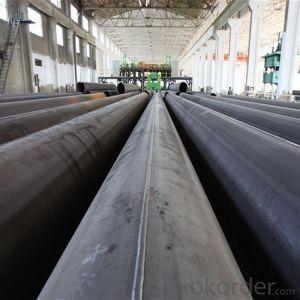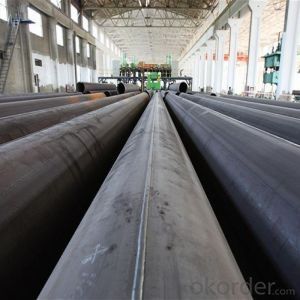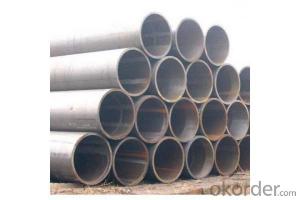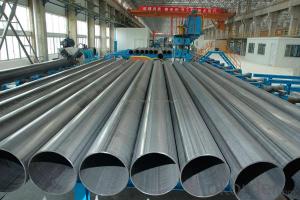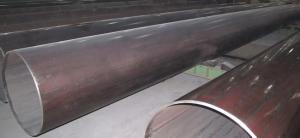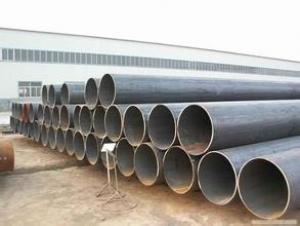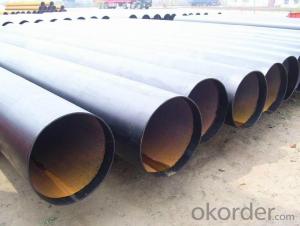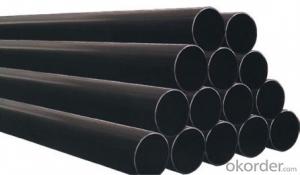22'' CARBON STEEL LSAW WELDED PIPE API/ASTM/JIS/DIN
- Loading Port:
- Tianjin
- Payment Terms:
- TT OR LC
- Min Order Qty:
- 5 m.t
- Supply Capability:
- 300 m.t/month
OKorder Service Pledge
OKorder Financial Service
You Might Also Like
Packaging & Delivery
Packaging Detail: | standard export packing or as customer's requirement |
Delivery Detail: | within 10 - 30 days |
Specifications
Spiral Welded Steel Pipes and Tubes
1.Material:Q195-Q235
2.Length:1-12m
3.WT:1.0-14mm
4.O.D.:20-273mm
Product Description:
1.Material : Q235,Q345,L245,L290,L360,L415,L450,L485,GrB,X42,46,X52,X56,X60,X65,X70,X80,X100
2,Standard: SY/T5037-2000,GB/T9711-2011,API Spec 5L PSL1/PSL2,ASTM A252\A53,ISO3183,DIN17172,EN10217,JIS G3457,AWWA C200,ASTM A139,ASTM A671,ASTM A672
3.Wall thickness: 3.0mm-30mm
4.Outer diameter: φ168mm-3020mm
5,Length: 5m-12m or as your requirement
6,Corrosion protection standard: DIN30670,DIN30671, AWWAC210, AWWA C203, SY/T0413-2002,SY/T0414-2002
7,Application: Oil, gas, natural gas, water pipe, thermal electricity pipe, steel structure engineering, etc
Q195-q345 Material Steel Pipe's Materials
Elements | Chemical Compsition% | Mechanical Property | ||||||
C% | Mn% | S% | P% | Si% | Yield Point (Mpa) | Tensile Strength(Mpa) | Elongation | |
Q195 | 0.06-0.12 | 0.25-0.50 | <0.050< span=""> | <0.045< span=""> | <0.030< span=""> | >195 | 315-430 | 32-33 |
Q215 | 0.09-0.15 | 0.25-0.55 | <0.05< span=""> | <0.045< span=""> | <0.030< span=""> | >215 | 335-450 | 26-31 |
Q235 | 0.12-0.20 | 0.30-0.70 | <0.045< span=""> | <0.045< span=""> | <0.030< span=""> | >235 | 375-500 | 24-26 |
Q345 | <0.20< span=""> | 1.0-1.6 | <0.040< span=""> | <0.040< span=""> | <0.55< span=""> | >345 | 470-630 | 21-22 |
Packaging & Delivery
Packaging Detail: | Normal exporting packing,in container or bulk vessel or as per clients' request |
Delivery Detail: | 2 months after confimed contract |
Specifications
Large Diameter API 5L X70 PSL2 LSAW Steel Pipe
Grade: X42, X46, X50, X52, X60, B, C
OD: 1.5"-28"
WT: SCH10-SCH160
Brand:TPCO
Large Diameter API 5L X70 PSL2 LSAW Steel Pipe
Specifications:
u Standard: API 5L
u Grade: B, C, X42, X46, X50, X52, X56, X60, X65, X70, X80
u OD: 1.5"-28"
u WT: SCH10-SCH160
u Length: 5-12m
u Ends Finish: plain end, bevel end, grooved end
u Surface Treatment: bare, black varnished, oiled finish, red color, anti-corrosion, 3PE, FBE or epoxy coating
u Technique: hot rolled or cold drawn
u Application: api 5l steel pipe for conveying oil, water, gas
u Invoicing: based on theoretical weight or actual weight
u Payment Terms: L/C at sight, T/T or Western Union
u Trade Terms: FOB, CFR, CIF
u Certification: ABS manufacturing assessment, ABS design assessment, API 5CT, API 5L, DNV manufacturer certificate, ISO9001 quality management system certificate, ISO14001 environment management system certificate, GB/T28001 occupational health and safety management system certificate, A1 class manufacturing license of special equipment certificate, CCS, GL, LR, SGS, TüV, PDE
- Q: Can steel pipes be recycled?
- Yes, steel pipes can be recycled. Steel is a highly recyclable material, and the recycling process for steel pipes involves melting them down to create new steel products. Recycling steel pipes not only conserves natural resources but also reduces energy consumption and carbon emissions associated with the production of new steel.
- Q: Are steel pipes suitable for underground chemical transport?
- Steel pipes are widely regarded as appropriate for transporting chemicals underground because of their high strength and durability. They have the ability to endure the pressure and weight of the soil above, rendering them impervious to harm or collapse. Furthermore, steel pipes possess corrosion resistance, which is vital when conveying chemicals that might react with or corrode other substances. They also have the capability to handle a wide range of temperatures, making them suitable for transporting chemicals that necessitate specific temperature conditions. Nevertheless, it is crucial to carefully consider the particular chemical being transported and seek advice from experts in chemical engineering or pipeline design to guarantee the compatibility of the steel pipes with the chemical and the implementation of any necessary safety precautions.
- Q: What is the weight of steel pipes?
- The weight of steel pipes can vary depending on their size, length, and thickness. However, on average, steel pipes typically weigh between 1.1 to 1.4 pounds per foot.
- Q: What are the common defects found in steel pipes?
- Some common defects found in steel pipes include corrosion, cracks, dents, and leaks. Other defects may include misalignment, improper welding, and pipe wall thinning. These defects can lead to reduced structural integrity, compromised performance, and potential failure of the pipes. Regular inspections and maintenance are essential to identify and address these issues promptly.
- Q: What are the different types of steel pipe supports?
- There are several types of steel pipe supports, including pipe hangers, pipe clamps, pipe saddles, pipe brackets, and pipe supports with rollers.
- Q: How are steel pipes used in the food and beverage industry?
- Steel pipes are commonly used in the food and beverage industry for various applications including transporting water, steam, gases, and other liquids. They are preferred due to their durability, strength, and resistance to corrosion, ensuring the safety and hygiene of food and beverage products. These pipes are used in processes such as conveying ingredients, transferring liquids and gases during production, and supplying utilities like water and steam for cleaning and sterilization purposes.
- Q: What are the different types of steel pipe coatings for offshore applications?
- There are several types of steel pipe coatings commonly used for offshore applications. These include fusion bonded epoxy (FBE) coatings, polyethylene (PE) coatings, polypropylene (PP) coatings, and three-layer polyethylene (3LPE) or polypropylene (3LPP) coatings. Each coating has its own unique properties that make it suitable for specific offshore conditions and requirements.
- Q: How are steel pipes used in the construction of underground parking garages?
- Steel pipes are commonly used in the construction of underground parking garages for various purposes such as drainage, ventilation, and structural support. They are used as conduits for underground utilities, including water supply and sewage systems. Additionally, steel pipes are often used as piling or foundation elements to provide stability and support to the structure, especially in areas with challenging soil conditions. Overall, steel pipes play a crucial role in ensuring the functionality and durability of underground parking garages.
- Q: What is the maximum operating temperature for steel pipes?
- The maximum operating temperature for steel pipes can vary depending on the grade of steel used, but it is generally around 1000°C (1832°F) for standard carbon steel pipes.
- Q: What is the difference between internal threading and external threading of steel pipes?
- Internal threading and external threading are two different methods used to create threads on steel pipes. The main difference between them lies in the location of the threads. Internal threading refers to the process of cutting threads on the inside surface of a steel pipe. This method involves using a tool or a die to remove material from the inner diameter of the pipe, creating a helical groove. The resulting threads can be used to connect the pipe to other components, such as fittings or valves. On the other hand, external threading involves cutting threads on the outside surface of a steel pipe. This process usually requires the use of a threading die or a lathe to remove material from the outer diameter of the pipe, leaving behind a helical groove. The external threads allow the pipe to be connected to other components or fittings that have corresponding internal threads. The choice between internal and external threading depends on the specific application and the requirements of the project. Internal threading is often preferred when the pipe needs to be connected to components that have external threads, such as fittings or valves. External threading, on the other hand, is typically used when the pipe needs to be connected to components with internal threads, or when the pipe is intended to be screwed into a threaded hole or coupling. In summary, the main difference between internal threading and external threading of steel pipes is the location of the threads – internal threads are cut on the inside surface of the pipe, while external threads are cut on the outside surface. The choice between these methods depends on the specific application and the type of connections required.
Send your message to us
22'' CARBON STEEL LSAW WELDED PIPE API/ASTM/JIS/DIN
- Loading Port:
- Tianjin
- Payment Terms:
- TT OR LC
- Min Order Qty:
- 5 m.t
- Supply Capability:
- 300 m.t/month
OKorder Service Pledge
OKorder Financial Service
Similar products
Hot products
Hot Searches
Related keywords
